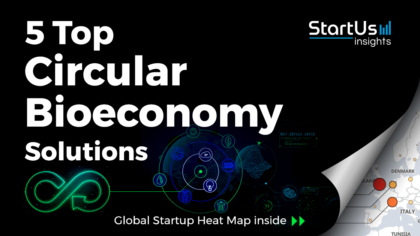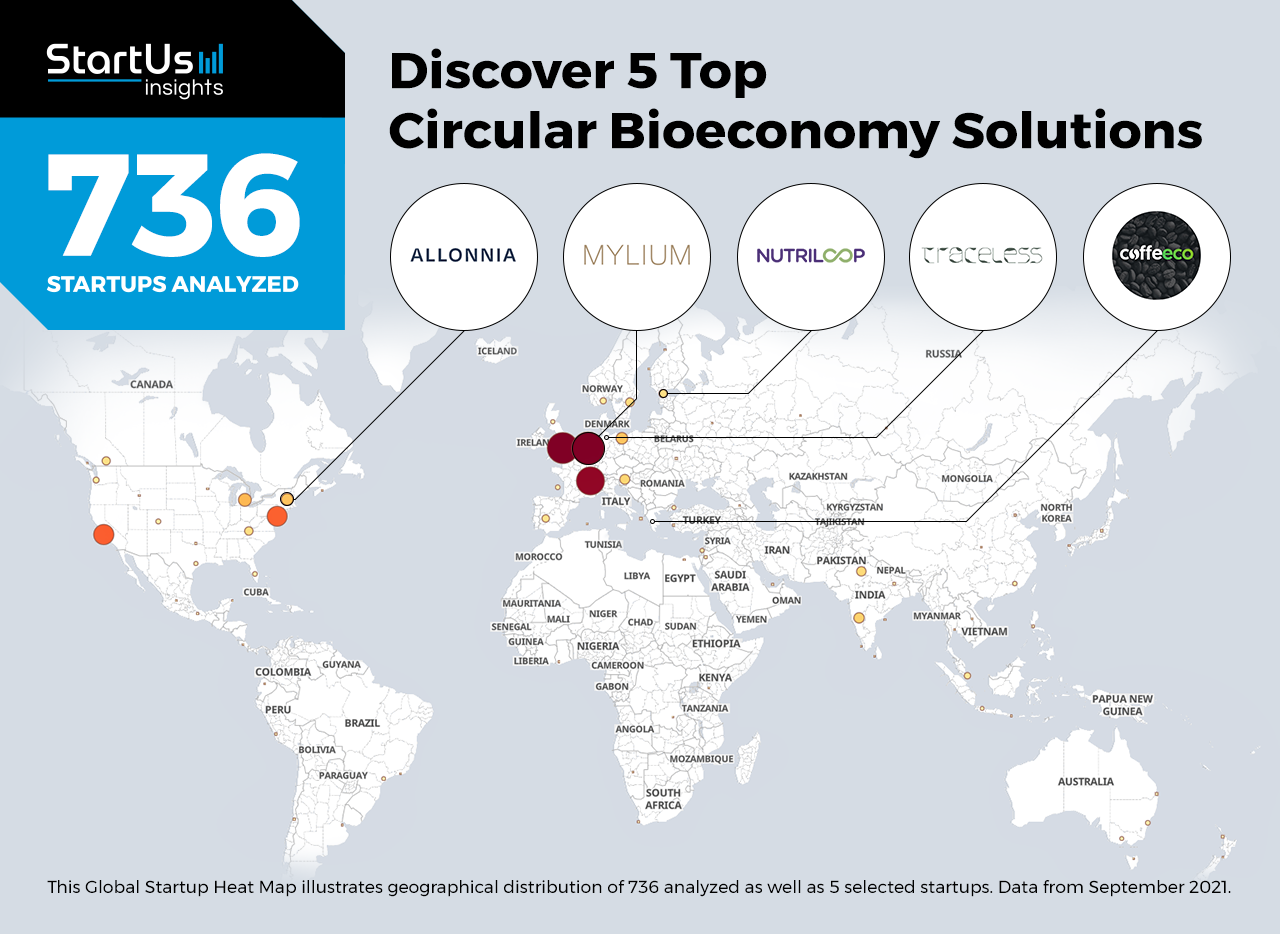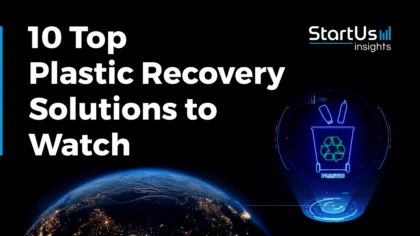Staying ahead of the technology curve means strengthening your competitive advantage. That is why we give you data-driven innovation insights enabling the circular economy. This time, you get to discover 5 hand-picked circular bioeconomy startups.
Out of 736, the Global Startup Heat Map highlights 5 Top Circular Bioeconomy Startups
The insights of this data-driven analysis are derived from the Big Data & Artificial Intelligence-powered StartUs Insights Discovery Platform, covering 2 093 000+ startups & scaleups globally. The platform gives you an exhaustive overview of emerging technologies & relevant startups within a specific field in just a few clicks.
The Global Startup Heat Map below reveals the distribution of the 736 exemplary startups & scaleups we analyzed for this research. Further, it highlights 5 circular economy startups that we hand-picked based on criteria such as founding year, location, funding raised, and more. You get to explore the solutions of these 5 startups & scaleups in this report. For insights on the other 731 circular bioeconomy solutions, get in touch.
traceless materials offers Bio-based Materials
Fossil-based materials, such as plastics and other polymers, find use in a wide range of commercial and consumer products. However, both the production and disposal of these materials are polluting. This is why materials startups are switching to bio-based materials. These materials are generally recyclable and biodegradable, as well as enable the circular economy when produced from the waste feedstock.
German startup traceless materials develops bio-based materials. The startup’s technology utilizes agricultural and brewery residues to create its base material. It then produces plastic films, hard plastics, and coatings for use in packaging. In addition to furthering the circular economy, the startup’s solutions offer companies sustainable alternatives for single-use plastics.
NutriLoop develops a Nutrient Looping System
Cities generate large amounts of organic waste in restaurants, food processing units, and homes. Most of this waste ends up in landfills or incinerators, contributing to pollution. Moreover, a significant proportion of organic waste contains nutrients, worsening food scarcity problems. Circular bioeconomy solutions close the nutrient loop by channeling nutrients from organic waste back into food and feed production.
NutriLoop is an Estonian startup that offers a nutrient looping system. The startup collects separated organic waste from municipalities and sorts it by quality and properties. Its waste valorization process transforms the waste into sustainable agrochemicals. NutriLoop’s system closes the nutrient loop, as well as allows farmers to engage in regenerative agriculture.
Mylium produces Vegan Fabrics
The production of textiles, both synthetic as well as natural fibers like cotton, requires enormous amounts of water as input. Moreover, due to short-lived fashion trends, clothes generally have a short lifespan after which they end up in landfills. To improve sustainability in the fashion industry, startups are developing circular fabrics. Besides, so as to promote circularity, startups use organic waste as the starting material to develop these fabrics.
Mylium is a Dutch startup that provides sustainable fabrics. The startup’s fabrics are composed of mycelium, a fibrous material found in fungal roots. The material utilizes agricultural residue and grows into thread-like structures. In addition to being more sustainable, the startup’s solution also offers a vegan alternative to animal-based fabrics while providing comparable quality.
Coffe-eco enables Coffee Waste Upcycling
Food processing units and food businesses produce large amounts of leftover and spent waste. Most of it is low value and, therefore, ends in landfills, further increasing the carbon footprint of the food industry. Circular bioeconomy solutions derive valuable ingredients from food waste, thereby closing the loop. In addition to improving sustainability, this also lowers the cost of fresh ingredients for food startups and scaleups.
Greek startup Coffe-eco upcycles coffee waste into high value-added products. The startup collects end-of-life espresso grounds and extracts natural compounds from them. These compounds find applications in the development of new formulations for the cosmetics and food industries. By incorporating reverse logistics and low-energy manufacturing technologies, the startup further improves the sustainability of its processes.
Allonnia advances Circular Wastewater Treatment
Wastewater from commercial and residential units often contains large amounts of organic matter. Circular bioeconomy startups mine wastewater and bring valuable materials from wastewater streams back into production cycles. By recovering value from waste, circular solutions improve the profitability of the biological treatment of wastewater.
US-based startup Allonnia develops a circular wastewater treatment solution. It engineers enzymes, proteins, and microbes that break down organic contaminants in wastewater. The startup’s process then recovers and upcycles valuable compounds from these contaminants. Along with enabling resource remediation, Allonnia’s solution also supplements the existing biological treatment process in wastewater treatment plants.
Discover more Circular Economy startups
Startups such as the examples highlighted in this report focus on bio-based materials, closed-loop systems, waste upcycling as well as alternatives to animal-based products. While all of these technologies play a major role in advancing the circular economy, they only represent the tip of the iceberg. To explore more technologies enabling the circular economy, simply get in touch to let us look into your areas of interest. For a more general overview, you can download one of our free Industry Innovation Reports to save your time and improve strategic decision-making.



![Explore the Top 10 Circular Economy Trends & Innovations [2025]](https://www.startus-insights.com/wp-content/uploads/2025/03/Circular-Economy-Trends-SharedImg-StartUs-Insights-noresize-420x236.webp)





